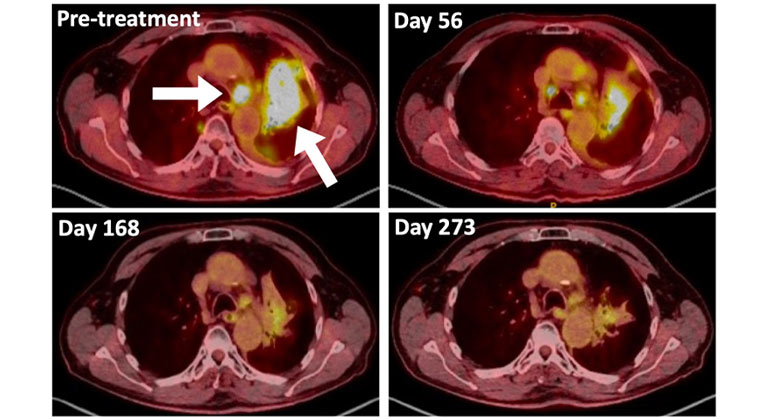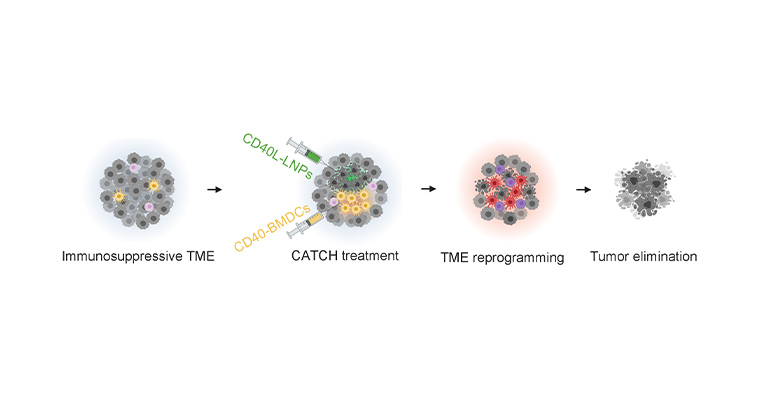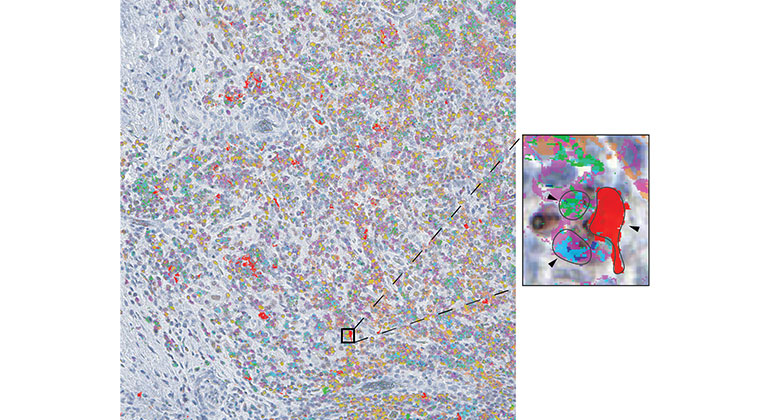Mount Sinai School of Medicine Researchers Awarded “Provocative Questions” Grant from National Cancer Institute
Researchers are among a select group of scientists who have been recognized for their quest to answer the most pressing questions about cancer.
Two Mount Sinai School of Medicine researchers are among a select group of scientists from around the world who have been recognized by the National Cancer Institute (NCI) for their quest to answer the most pressing questions about cancer. Stuart Aaronson, MD, Professor and Chair of Oncological Sciences and Ross Cagan, PhD, Professor of Oncological Sciences at Mount Sinai, have received the NCI’s new "Provocative Questions" grant, which was established to explore the important yet less obvious questions about cancer that may have been neglected in this era of significant discovery.
Provocative Question: Why do many cancer cells die when suddenly deprived of a protein encoded by an oncogene?
The grant will support Dr. Aaronson’s research on signaling pathways responsible for a little-understood phenomenon called oncogene addiction. Oncogenes are mutant genes that scientists believe are key to tumor survival and progression. Disruption of the signaling pathway in these oncogenes has been shown to halt tumor growth or lead to tumor cell death. Dr. Aaronson’s lab is exploring the signaling activity of one such pathway called Wnt, which plays a key role in regulating self-renewal of a variety of embryonic and adult stem cells and is a starting point for tumor development.
Dr. Aaronson’s lab has found that inhibition of activated Wnt signaling can block growth and complement the effects of chemotherapy and radiation, leading to tumor cell death. The goals of this grant are to investigate the signaling pathways responsible for Wnt oncogene addiction, and discover its molecular basis.
"While increasing efforts are being made to develop effective inhibitors of Wnt signaling in tumors, to date, few, if any, have entered into clinical development," said Dr. Aaronson. "Our NCI grant will support our research to identify and characterize specific and potent Wnt-targeted drugs that can disrupt this oncogene addiction in tumor cells and increase the efficacy of therapy for Wnt-activated human cancers. We are honored to be recognized by the NCI for our efforts in this area."
Provocative Question: How does obesity contribute to cancer risk?
Research has shown a distinct connection between obesity and cancer risk, but the mechanism behind that risk is unclear. With support from the NCI grant, Dr. Cagan’s laboratory will create a model of pancreatic cancer in fruit flies to learn the molecular signatures that predict how a tumor responds to diet-induced obesity. Dr. Cagan’s team will also perform a genetic screen on fruit flies to learn which genes promote tumor growth. Armed with this information, Dr. Cagan’s team will test a variety of drugs approved by the U.S. Food and Drug Administration to determine which ones may prevent diet-related tumor growth.
"The fact that high-sugar diets cause tumors to become more aggressive is long-established, but we still do not know why," said Dr. Cagan. "This NCI grant will allow us to better explore the pathways that link obesity to enhanced tumor growth and to explore whether compounds that address this link are potentially useful as treatments. We appreciate the opportunity to take a non-traditional approach to an old question."
The Provocative Questions grant will support the research of Drs. Aaronson and Cagan for five years. They will each receive $351,713 in the first year. Allocations for subsequent years are to be determined.
The Provocative Questions program seeks to identify and solve perplexing problems facing cancer research. It is intended to build on specific advances in the understanding of cancer and cancer control; address broad issues in the biology of cancer that have proven difficult to resolve; take into consideration the likelihood of progress in the foreseeable future; and address ways to overcome obstacles to achieving long-term goals. Out of 750 applications, only 24 were awarded. For more information, please visit http://provocativequestions.nci.nih.gov/.
About The Mount Sinai Medical Center
The Mount Sinai Medical Center encompasses both The Mount Sinai Hospital and Mount Sinai School of Medicine. Established in 1968, Mount Sinai School of Medicine is one of the leading medical schools in the United States. The Medical School is noted for innovation in education, biomedical research, clinical care delivery, and local and global community service. It has more than 3,400 faculty in 32 departments and 14 research institutes, and ranks among the top 20 medical schools both in National Institutes of Health (NIH) funding and by U.S. News & World Report.
The Mount Sinai Hospital, founded in 1852, is a 1,171-bed tertiary- and quaternary-care teaching facility and one of the nation’s oldest, largest and most-respected voluntary hospitals. In 2011, U.S. News & World Report ranked The Mount Sinai Hospital 14th on its elite Honor Roll of the nation’s top hospitals based on reputation, safety, and other patient-care factors. Mount Sinai is one of 12 integrated academic medical centers whose medical school ranks among the top 20 in NIH funding and U.S. News & World Report and whose hospital is on the U.S. News & World Report Honor Roll. Nearly 60,000 people were treated at Mount Sinai as inpatients last year, and approximately 560,000 outpatient visits took place.
For more information, visit http://www.mountsinai.org/.
Find Mount Sinai on:
Facebook: http://www.facebook.com/mountsinainyc
Twitter @mountsinainyc
YouTube: http://www.youtube.com/mountsinainy
About the Mount Sinai Health System
Mount Sinai Health System is one of the largest academic medical systems in the New York metro area, with more than 43,000 employees working across eight hospitals, over 400 outpatient practices, nearly 300 labs, a school of nursing, and a leading school of medicine and graduate education. Mount Sinai advances health for all people, everywhere, by taking on the most complex health care challenges of our time — discovering and applying new scientific learning and knowledge; developing safer, more effective treatments; educating the next generation of medical leaders and innovators; and supporting local communities by delivering high-quality care to all who need it.
Through the integration of its hospitals, labs, and schools, Mount Sinai offers comprehensive health care solutions from birth through geriatrics, leveraging innovative approaches such as artificial intelligence and informatics while keeping patients’ medical and emotional needs at the center of all treatment. The Health System includes approximately 7,300 primary and specialty care physicians; 13 joint-venture outpatient surgery centers throughout the five boroughs of New York City, Westchester, Long Island, and Florida; and more than 30 affiliated community health centers. We are consistently ranked by U.S. News & World Report's Best Hospitals, receiving high "Honor Roll" status, and are highly ranked: No. 1 in Geriatrics and top 20 in Cardiology/Heart Surgery, Diabetes/Endocrinology, Gastroenterology/GI Surgery, Neurology/Neurosurgery, Orthopedics, Pulmonology/Lung Surgery, Rehabilitation, and Urology. New York Eye and Ear Infirmary of Mount Sinai is ranked No. 12 in Ophthalmology. U.S. News & World Report’s “Best Children’s Hospitals” ranks Mount Sinai Kravis Children's Hospital among the country’s best in several pediatric specialties.
For more information, visit https://www.mountsinai.org or find Mount Sinai on Facebook, Twitter and YouTube.

A Type of Allergy Medicine Might Help Treat Lung Cancer, Research Suggests
Dec 06, 2023 View All Press Releases
Diabetes May Accelerate Blood Cancer Growth, Yet Survival Outcomes Differ by Race
Sep 29, 2023 View All Press Releases
Mount Sinai Awarded $3.4 Million to Study Prostate Cancer in People With HIV
Sep 12, 2023 View All Press Releases
New RNA-based Therapy Combats Melanoma in Mouse Models
Jul 27, 2023 View All Press Releases
Study Reveals a Trio of Immune Cells Vital in Response to Liver Cancer Immunotherapy
Jun 15, 2023 View All Press Releases


